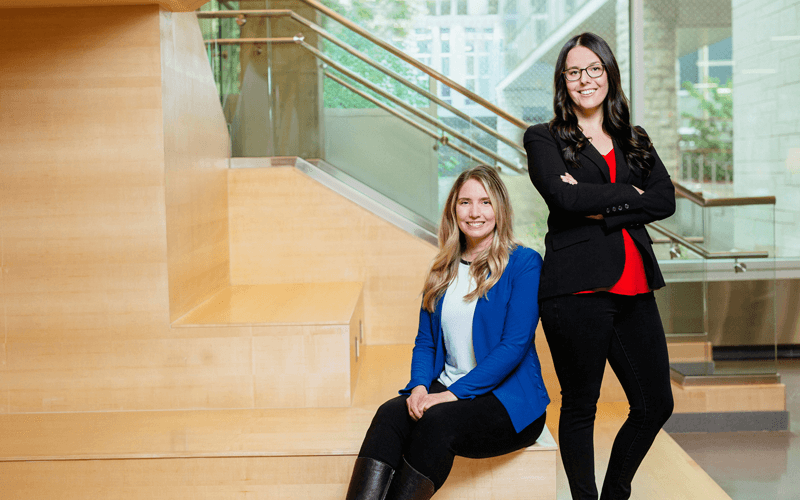Collaboration aims to improve representation of women in leadership

This article was originally published by the Edwards School of Business.
How can mindfulness help improve the representation of women in leadership? This is the big question Professors Erica Carleton and Megan Walsh spend a lot of time thinking about and connects their diverse, yet overlapping research.
Since 2017, the duo have been investigating the impact of mindfulness and sleep on employee well-being within the context of gender and leadership at the organizational and individual levels.
Collectively their work aims to challenge gender biases and understand how women can be better represented in leadership positions. As Assistant Professors of Human Resources and Organizational Behaviour, the two colleagues use their passion for research on gender and leadership to delve further into this issue. Both collaborators were recently awarded Insight Development grants in 2018 and 2019, respectively, from the Social Sciences and Humanities Research Council (SSHRC).
What do you find most exciting about leadership research?
MW: Leaders have such a huge impact on organizations. When you understand their mental health or how to get more women into those positions, it makes a big impact not just on the leaders themselves, but the people who they’re influencing. It’s a central position to be in, and I think understanding those positions is important.
EC: With leadership, I agree; it is such a central and important position. What we do is focus on understanding the individual leader, and what they bring with them to work and how work affects them in terms of their health and well-being instead of just focusing on the outcomes leaders have on employees.
In two sentences, describe your research program and why it matters.
EC: I study leaders’ health and well-being and more recently how gender is related. It is important because by aiming to improve women’s health, we’re also helping them get into leadership roles. On the flip side, by helping those who hire and promote work on their own health, we can also help them be less biased in their decision-making.
MW: My research program focuses on leadership, gender and well-being at work and it matters because ensuring leaders are healthy, able to thrive and deal with challenges at work, such as gender related issues, is important in creating productive and equitable workplaces.
"If we can, through mindfulness and discussions on sleep and wellbeing, help people make better, less biased hiring and promotion decisions, that is ideal."
Erica Carleton
Why does working together work for you?
EC: Our collaboration works because we trust each other, and that’s key to any relationship, but especially doing research. We speak openly with one another—any concerns or worries we are willing to share with each other. The other reason it works is that we’re friends and we’re friendly.
MW: Research can be a bit lonely at times, but when you have someone who you can collaborate with, speak openly with, and share ideas and brainstorm, you uplift each other.
Why should people care about gender and leadership?
EC: Ensuring that future generations of women are thinking of themselves as leaders and wanting to be leaders. There is research showing that on days leaders sleep less, they are more abusive. It is understanding what leaders bring with them to work and how that impacts their work-related behaviours. Mindfulness is a key piece in that it’s a potential way for people to regain control and regenerate themselves. That way, they’re not having a negative influence on others.
MW: Women are drastically underrepresented in top leadership roles. At the root of that underrepresentation are often negative stereotypes—that women aren’t as effective as leaders. We won’t see those stereotypes change until we see more women in those positions. Organizations can also be more competitive when they have women in power. It is important to utilize and celebrate that source of talent and make sure that women are being given the same chances to get there.
What advice would you give to leaders?
MW: My advice would be to focus on your wellness. If you don’t have the resources to maintain your own health at work, how can you help other people?
EC: If we can, through mindfulness and discussions on sleep and wellbeing, help people make better, less biased hiring and promotion decisions, that is ideal. That’s what we’re trying to accomplish.
What do you want Edwards’ students to understand about leadership by the time they graduate?
EC: I want students to be able to see themselves as leaders. Even though they might not be in a leadership role, to understand that they may be leaders someday and they can develop these skills. Leadership is something that is developed and by learning about leadership, they are already starting to understand those skills that will eventually come to matter in their lives.
MW: Make sure, as a leader, you’re aware of not only your wellness but how your behaviour is potentially being perceived by others. People are always looking to you for what to do. Make sure you’re in a position where you have the resources to role model what you want to see in others.
Our faculty are extensively involved in partnerships for research, teaching and community engagement. Visit the Edwards Research Portal at edwards.usask.ca/research for more information.
